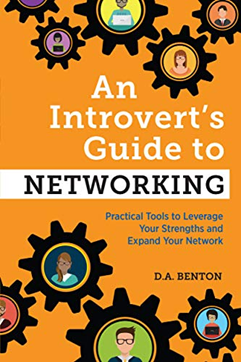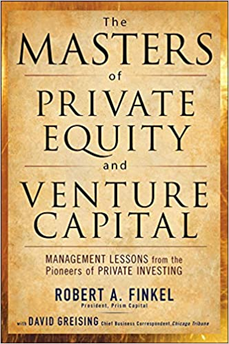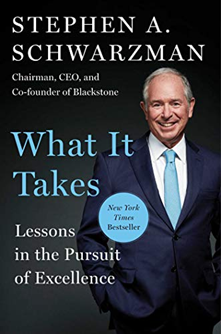There’s certainly no shortage of media for today’s dealmakers, from news to trade publications to podcasts. But sometimes what you really want is a deeper dive with a book – so to help you focus your options, we curated a list of seven of the best private equity–focused books available today. From classic textbooks to the latest from Blackstone CEO Stephen Schwarzman, this list of private equity books will bring you new knowledge and insights on the latest private equity trends, from thought leaders in every sector of capital markets.
1. Mastering Private equity: Transformation via Venture capital, Minority Investments & Buyouts

Image source: MasteringPrivateEquity.com
This textbook, available on Amazon and MasteringPrivateEquity.com, could easily be the only reference book dealmakers need. Rather than using formal language to convey difficult concepts, as most textbooks do, this book offers an accessible, comprehensive coverage of the industry, earning it the top spot on our list. The book also provides readers access to a collection of real-world case studies as an accompanying resource for the lessons.
Mastering Private equity is written for novices, new practitioners, and seasoned professionals alike, according to Claudia Zeisberger, the book’s primary author. “For novices to the field of PE (private equity), our book provides clear insights into the workings of the industry,” she writes. “Graduate and post-graduate students will find the book an invaluable companion for their PE, venture capital, and entrepreneurship courses. For the seasoned financial professionals, the book includes guest comments from industry experts and links to advanced literature that provides a nuanced view of the industry.”
Mastering Private equity progresses through five sections:
- Definitions of various private equity terms, and a tour of the asset class and how it compares with other assets like real estate
- The process for sourcing and administering transactions, from origination to due diligence to allocation and liquidation
- Methods for maximizing value creation in portfolio companies (portcos) and preparing them for a successful exit
- Advice from industry veterans on how to manage private equity funds and juggle and grow the ever-evolving relationship between general partners (GPs) and limited partners (LPs)
- The future of the practice as a whole and how recent industry trends will shape the future
Henry R. Kravis, Co-Chairman and Co-CEO of KKR, says that Mastering Private equity truly defines private equity where other surveys fall short.
“I think it is safe for me to speak on the industry’s behalf when I say we have learned there is so much more to investing than buying low and selling high,” Kravis writes in the book’s foreword. “When we buy a company, we ask ourselves, ‘What can we do to make it better? How can we create value? What constituents should we be mindful of and will factor into a good outcome for everyone?’”
2. The New Tycoons: Inside the Trillion Dollar Private equity Industry That Owns Everything (Bloomberg)

Image source: Amazon
Our next top pick, The New Tycoons by Jason Kelly, chronicles the private equity industry’s original and enduring influencers, including Stephen Schwarzman, Henry Kravis, Mitt Romney, David Rubenstein, and David Bonderman. Like Mastering Private equity, The New Tycoons is written for a wide audience, and can help novices learn what the industry is all about.
The book reads like a Bloomberg news story, with twists and turns that highlight all the tension and drama within the industry. It provides a glimpse into the transformation of the private equity industry over time, as well as little-known trivia. For example, the firm Blackstone was named after the two startup founders Stephen Schwarzman — whose surname derives from the German word for “black” — and Peter Peterson — whose surname derives from the Greek word for “stone.”
“In all, a good book … [that] does not demonize or engage in hagiography,” writes financial services book reviewer and Chartered Financial Analyst® (CFA) David Merkel.
3. Private capital Markets: Valuation, Capitalization, and Transfer of Private Business Interests (Second Edition)

Image source: Amazon
Robert T. Slee’s textbook Private capital Markets tackles different ways to value, capitalize, and transfer business interests. Although not intended for casual readers, it’s a great resource for those looking to improve their work, move up in their leveraged buyouts (LBOs) firm, or simply administer better-informed, smooth, successful deals.
Before Slee’s work was published, corporate finance experts and practitioners used a single capital asset pricing model which held that a business could have only a single value at any given time, so finance experts had only a very limited list of ways that those businesses could access capital. The finance world also once held a shared assumption about exit strategies, and believed every privately held business should endeavor to go public (IPO).
Private capital Markets challenges all those beliefs. The book explores various ways to value a private company within relativity, and revolutionizes the “asset class” discussion by diving deeper into types of private capital — a creative lesson that no one before or since has exhaustively covered. The book addresses numerous options for transfers of business interests, and includes employee stock ownership plans (ESOPs), charitable trusts, going public or private, and family transfers.
Every chapter ends with a brief exploration of how capital solutions depend on relative valuation, while the transference of business interests depends on both. John Paglia, Professor of Finance and Senior Associate Dean of Academic Affairs at Pepperdine University, centers his finance class around this text to help his students better grasp the capital market.
“Students in this class who have not been exposed to the [midmarkets] often are shocked at the way business is done in this space,” Paglia writes in the book’s foreword. “It seems that after even one corporate finance course, students grow accustomed to the efficiency and precision of the public markets … Many feel as though they are ‘off-roading’ after becoming accustomed to driving on the ‘corporate finance freeway.’”
4. An Introvert’s Guide to Networking: Practical Tools to Leverage Your Strengths and Expand Your Network

Image source: Amazon
Networking and relationship-building are vital in business and private equity dealmaking. However, establishing and developing those relationships can be intimidating for introverts.
Executive coach and leadership speaker Debra Benton shares useful tips for improving communication skills in her book An Introvert’s Guide to Networking. Benton guides readers through the necessary steps for succeeding at the relationship-building game — starting with accepting, rather than denying, one’s introverted nature.
Rather than viewing touchpoints as strictly sales-oriented, Benton suggests professionals view them as opportunities for genuine human connection. She also advises introverts to prepare a list of steps — such as researching touchpoints and their business goals, finding a good time or event to connect with a touchpoint, and planning ways to break the ice — to successfully move forward with an engagement.
Benton concludes the book by recommending that firms invest in a management system to handle all new and ongoing relationships, so professionals don’t neglect to capture the critical details of their interactions. A forgotten conversation could mean a missed deal or a lost relationship, which is why private equity firms must document key details for every touchpoint.
5. Private equity Demystified: An Explanatory Guide (Fourth Edition)

Image source: Amazon
Published in 2020, Private equity Demystified is the most up-to-date reference on our list. Its authors, John Gilligan and Mike Wright, first published the book as a practical guide a few months before the 2008 financial crisis, and released the second edition directly after. By the time the 2020 edition was published, Gilligan and Wright had devoted a whole section to defending private equity work, and a theme of justificatory guardianship now threads throughout the book.
Like the title suggests, Private equity Demystified is for anyone unfamiliar with, or perplexed by, the industry. The book defines the industry and provides an overview of the private equity market, sector players, and their motivations. It also describes funds and fundraising, leverage, investment theories, manager compensation, and day-to-day dealmaker duties.
“I only wish all commentators had such an informed and balanced view of a complicated area,” said Philip Rattle, Managing Partner of August Equity. “I gave it to my sons to explain what I do for a living — I can think of no higher praise.”
6. The Masters of Private equity and Venture capital: Management Lessons from the Pioneers of Private Investing

Image source: Amazon
Robert Finkel’s The Masters of Private equity and Venture capital draws on his experience as Co-Founder of the Illinois Venture capital Association. During his tenure, the association hosted a series of discussion panels called “VC Confidential,” during which “pioneers of the profession” passed down secrets of the trade. Finkel curated the best of those recommendations and compiled them into this easy-to-read collection of lessons.
The book will interest both casual readers and seasoned professionals, though discerning readers whose day-to-day activities involve actual private equity deals will benefit the most. Readers will come away with useful tools and tactics, plus a new appreciation for the creativity of the industry’s innovators.
Throughout the book, successful dealmakers diligently analyze their past mistakes and scrutinize the wins of other dealmakers. According to one reviewer, the book is the “most insightful and well-written book I have read on private investment … [A] very underutilized resource for investment bankers such as myself that want a better understanding of what investors are considering.”
7. What It Takes: Lessons in the Pursuit of Excellence

Image source: Amazon
Blackstone Chairman, CEO, and Co-Founder Stephen A. Schwarzman — a man private equity professionals love to criticize but secretly admire — had perhaps the most famous individual journey in all financial services history. His book offers a pithy list of lessons and provides a welcome peek behind the curtain of his success.
What It Takes includes advice such as:
- Remove obstacles for yourself. One of the biggest obstacles people face is fear of failure. Instead of worrying whether something will work, take the chance and try it.
- Pursue worthy fantasies and dreams. Learn the difference between goals that are doable and those that aren’t — and go after the most viable ones.
- Learn to see around corners. Project the lessons you’ve learned into the future. Listen for trouble and sidestep it if you can, and learn from any pitfalls you encounter.
Schwarzman’s book has earned nearly 2,300 Amazon ratings, 75% of which are five-star reviews. “I really enjoyed this book as it also discussed the major financial issues in the past 30 years,” writes one reader. “The style was very personable and there is excellent advice, particularly for people in college or who are early in their careers.”
Do more for your private equity firm
Ready to implement the insights learned from these private equity books and equip your firm with advanced technology? Schedule a demo today to learn how Intapp DealCloud can help.
